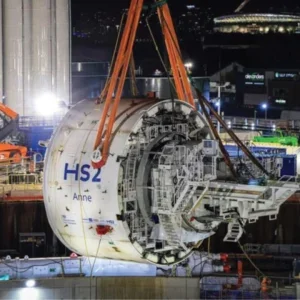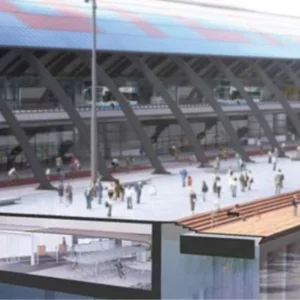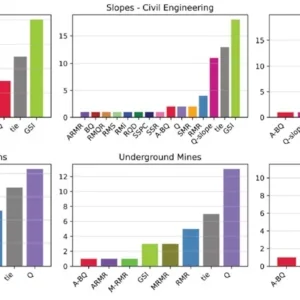The tunnelling and underground Construction Academy (TUCA) was set up by Crossrail Limited to bridge the skills gaps it knew it would encounter along the way. But while the Crossrail project itself is nearing its conclusion, there is still plenty of life in its training academy. The GBP 13M (USD 16.9M) academy in Ilford, east London, was part-funded by a GBP 5M (USD 6.5M) grant from the Skills Funding Agency and by sponsorship from major contractors and opened its doors in September 2011. This first incarnation followed Crossrail’s in-depth skills forecasting exercise, which looked at both the demand for and the availability of the expertise required to deliver the whole project. The forecast flagged up some skills gaps in the first phase of the project – the tunnel construction itself.
The study looked at what other skills providers were already offering and at the number of people working in the industry. The conclusion was that while Crossrail would require around 2,000 tunnellers, only 500 were working in the UK at that time. Many of this workforce were also “at the higher end of the age bracket”, leading to fears that the combination of an ageing workforce and the lack of a formal pipeline for people to come into the industry could result in a loss of existing skills and expertise.
The forecasting dug deeper and scrutinised specific job roles and functions – plant operations, shuttering and form work and so on. It predicted some issues around particular types of plant but deemed that these could be covered by existing training provision. However, the skills gap that caused the most concern was in sprayed concrete lining (SCL). “Crossrail had looked at how the wider tunnelling industry was meeting its skills needs, including at the Hagerbach training centre in Switzerland,” said Georgina Bigam, strategy and commercial manager for TfL at TUCA.
“But Hagerbach specialises in hard rock tunnelling – very different to the type of tunnelling Crossrail needed, which was going through soft rock and using a combination of TBMs and sprayed concrete.
“Another thing Crossrail found was that there wasn’t an existing qualification and skills structure for SCL. What had been happening was ‘informal apprenticeships’ where someone had taken a friend or relative down into the tunnel and taught them the job as they went along.”
There’s no doubt that a wealth of information and experience was being passed down in this way, but it wasn’t necessarily standardised, added Bigam. So, the rationale behind setting up a training academy was pretty compelling and TUCA, which is the only soft-ground tunnelling training facility in Europe, was established. Since then more than 17,500 people have received skills and safety training designed and delivered by industry experts.
The facility includes workshops with specially designed tunnel openings for practical training in SCL, a UKAS-certified materials testing laboratory (primarily for concrete testing), a tunnel mock-up, complete with railtrack and locomotives, in which to put health and safety learning into practice and seven classrooms.
For the first five years the training was managed by the Construction Industries Training Board (CITB) but in January this year there was a changing of the guard. Crossrail handed over the TUCA reins to Transport for London (TfL) and TfL, in turn, has appointed Prospects College of Advanced Technology (PROCAT) to deliver the training.
PROCAT is a specialist technical training college established to meet the workforce development needs of businesses that operate in sectors that are critical to the UK economy. This includes advanced apprenticeships to secure a pipeline of new talent and higher and degree apprenticeships, which follow the STEM model, leading the way in Science, Technology, Engineering and Mathematics.
Speaking at the time of the transfer, London’s Transport Commissioner, Mike Brown said TUCA had played a leading role in the Crossrail project and would leave “a lasting legacy”. “It is essential we continue to develop the skills this country needs to deliver major infrastructure projects,” he said. “I think there was always an expectation that TUCA would continue to provide tunnelling and underground construction training [after Crossrail],” said Bigam. “There was always an eye on HS2, Thames Tideway, Crossrail 2 and, obviously, all the work TfL undertakes, all of which is in soft ground.”
She added that the opportunity had then arisen for TfL, which is responsible for delivering, operating and maintaining the central section of the Elizabeth line, to provide additional training facilities at the academy.
TUCA will also be home to the Elizabeth line maintenance and station staff training centre. Facilities will include a mock-up station to train staff in customer service. More than 130 PROCAT railway engineering apprentices will start training at TUCA from September.
These new training facilities will add to TUCA’s offering and will not dilute or detract from its focus on tunnelling and underground construction in any way. The mock-up evacuation tunnel will be relocated to a new covered area just outside the building and will have “some extra facilities bolted on so it will be even better”. The space it currently occupies will be converted to accommodate the railway facilities and extra classrooms will be built on a new mezzanine level alongside a comprehensive railway maintenance training facility.
Meanwhile, TUCA’s tunnelling skills training curriculum continues to be driven by the needs of industry and it is evolving as those demands become clearer.
For example, the workshop where the practical SCL training takes place is currently underused simply because the Crossrail project is already well beyond that stage of construction. That’s not to say that there has been no workshop activity, however. For example in June, TUCA hosted a workshop run by BASF Underground Construction and partners, Atlas Copco, CK-Tech and CPI Euromix.
“TfL has been very upfront with regard to innovation and new approaches to technical solutions and to this end we were asked to put together a workshop to cover latest developments in sprayed concrete, in association with water management,” said Richard Foord, BASF project manager, Underground Construction UK and Ireland.
“The delegates were 50 engineers and inspectors from all shifts in TfL teams, split over two separate days to capture shift pattern,” he added. “The structure of the day had a real emphasis on practical demonstration and delegate engagement.” The use of the TUCA facility was maximised by group presentations to set the scene and cover design and theoretical matters with a taste of the innovation that followed. The whole group was then divided into three smaller teams who visited three separate, but technically related work stations throughout the day. These were:
¦ Sprayed concrete – concrete mix, production from silo, equipment and a spray demo and testing with assistance from specialist applicator Shotcrete Services;
¦ Water proofing – spray applied membrane, equipment, preparation, application and testing, interface with sheet membrane, all with practical input from Gunform Ltd;
¦ Injection – ground engineering, soil stabilisation, water stopping, sealing, re-injectible hoses, void filling using equipment and assistance from CK – Tech.
“The level of attention, the hands-on involvement and the quality of the questions was a reflection of the delegates’ knowledge of their roles and environment and keenness to learn more on new technology,” said Foord.
“The ability to provide a cohesive and stimulating workshop stems from the organiser’s fundamental knowledge of their business and a passion to share the information to a receptive audience,” he continued.
“The workshop was part of a long line of contact between
the parties in various arenas and formats over many years, (for which we are very grateful), and it is hoped that similar events can be held in the future to the mutual benefit of all,” said Foord.
More recently, TUCA hosted a five-day pilot TunnelSkills workshop. The Tunnel Surveying Skills Course ran from 31 July – 4 August and covered subjects such as handwork, pipe jacking and microtunnelling, TBM tunnelling, SCL tunnelling, equipment and project costs and laser scanning outputs and applications.
“We are now talking to industry to find out what we can develop and how we can put new courses together,” said Dave Watson, PROCAT project manager. “We are working with the TunnelSkills national specialist training forum, which meets at TUCA bi-monthly and with TUCA’s Industry Advisory Panel, which includes major clients and contractors from the underground construction sector.
“Wherever there is a demand for training, whether it’s in practical skills or in health and safety, we can develop that with the sector experts and put a package together.”
“We’re already working with Thames Tideway, which is about to start, but we have also engaged with HS2 as well as the national colleges for high speed rail,” added Bigam. “That’s for the longer term but starting those conversations now means we will be able to meet their needs in the future.”
There are two prongs to the training being offered – apprenticeship training and workforce development training, although Watson stresses that the emphasis is on the latter in respect of the underground construction offer. “This September there will be 2,000 learners doing one- to five-day courses and of that around 250 will be apprentices,” he said.
He added that TUCA has the ability to run on extended hours. “We have the ability to work 24/7, so if there is demand for training on a Saturday, that’s what we will provide. We really want the facility working to its capacity.”
In the workforce development camp, CPD courses ready to roll are the Tunnel Safety Training Scheme, a one-day classroom-based course, and Tunnel Entry and Emergency Procedures. This one-day course is split between classroom tuition and a spell in the mock-up tunnel where students are able to put theory into practice and is accredited by City & Guilds but is exclusive to TUCA.
New apprenticeship courses will be on offer later this year including – Tunnelling Operations (Level 2), Lab Technician (L2), Surveying technician (L3), Building Services technician (L4), Rail Operative (L2), Rail technician (L3/4) and Embedded Electronics (L6). The Tunnelling Operations course is being led by TunnelSkills. It is currently a Level 2 course, although Watson says the ambition is there to “upskill” that to a Level 3+.
Disciplines that will be taught on the course include site safety awareness, soil mechanics, concrete technology and environmental awareness, alongside practical training covering slinger signaller, maintenance of tunnelling plant, tunnel services, tunnel entry and evacuation and working with pressurised pipe systems.
“Another development we’re really keen on, post-Crossrail, is to keep the Materials Testing Laboratory going with Balfour Beatty’s continued backing, so we’re working with them at the moment to try to develop and expand an industry training offer” said Watson. “It is a first class facility and we want to add to it and expand the range of the materials testing CPD and apprenticeship offer [via the Lab Technician course].”
As with all the courses at TUCA, tunnelling courses are tutored by industry experts and it’s important for the credibility of the academy that the expertise is current and hands-on. “It goes hand-in-hand with designing a facility that employers in industry have been involved with,” said Bigam. “If the tutors delivering the training don’t have that same credibility, then people won’t come here to learn.”
She added that students were likely to see their tutors out on site, providing them with the confidence in their abilities. While the courses have to be commercially viable, TUCA’s mission remains one of providing a skills structure for the tunnelling industry – it’s not about turning a profit. So, although the figures have to add up, courses will be tailored to meet the needs of the few as well as the many. Whether there is a minimum number of students required to put a course on will be decided on a case-by-case basis.
“Some of the courses are classroom-based high volume, quick turnover,” said Bigam. “But we’ve also run courses in the past where there has been a requirement for it within the industry but not necessarily huge demand in terms of numbers. Take the SCL facility, for example. We trained 120 in SCL for Crossrail, which is not a massive number, but we couldn’t not do it.
“As to whether we would run one course for just five people and never run it again, it would depend on how much development time was needed, whether it was available elsewhere and whether it was relevant to our strategic aims,” she added. “What we are doing here is as much about developing a skills strategy for the industry as it is about pure training delivery. “SCL is a good example. The qualification that exists for that at the moment, EFNARC [European Federation of National Associations Representing Concrete], is internationally recognised but it isn’t aligned to any of the UK awarding bodies or accreditation centres, so that is something we could explore further,” said Bigam.
“There is a lot of SCL work going on across London Underground, TfL and other tunnelling projects, so we think it would be useful to have a standard qualification.” As TUCA’s strategy continues to evolve it is open to suggestions on the training it can provide. Feedback from the sector is welcome and the academy can be contacted by email at tuca@procat.ac.uk or by phone on +44 (0) 203 197 5002. Visits to the site are also welcome by prior appointment






